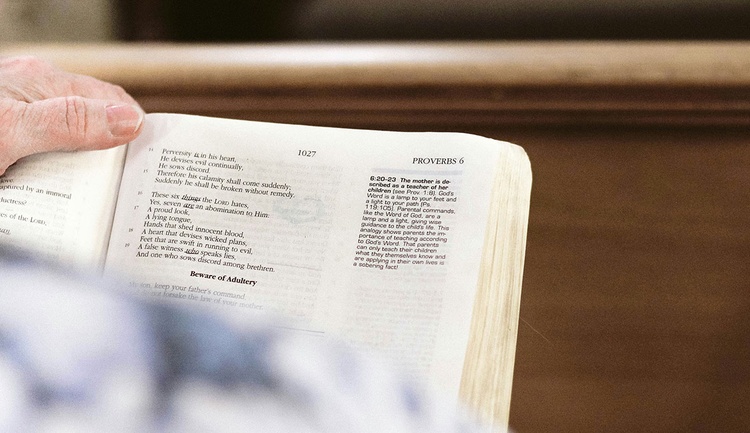I read comments from someone who thought they had the gift of discernment and lamented that no one talks much about this spiritual gift. I agree that it’s often avoided. This might be in part because many spiritual gifts, such as teaching, giving, encouraging, and serving, seem simpler to understand. And it might be in part because this is a sensitive subject to address with those who feel they have this gift, which is described in 1 Corinthians 12:10 as “the ability to distinguish between spirits.”
I have discovered that often, when people tell me they have the gift of discernment, instead of having a clear understanding of what biblical discernment refers to (distinguishing between what’s good and evil), they have total confidence their opinion is the correct one. Because they are identifying God as the source of their gift, their position, in their thinking, is unassailable. In essence, their opinion is God’s opinion.
Now, if that conclusion comes from careful study of the Word and consultation with wise brothers and sisters in Christ, they may have reason for some (though not total) confidence. But when they reason simply from their “gift of discernment,” I admit I am suspicious. In several cases, I have thought the person who says, “I have the gift of discernment” is like the person who says, “I’m always the smartest person in the room.”
The Danger of Pride
“Discernment” to some people means they know what is right and true, and most people don’t. Other Christians may have studied the Bible more, prayed more, and come to their conclusion after many more hours of thought and study and life experience, but this usually doesn’t concern the person who thinks they have the gift of discernment. Why? Because they believe that even without the research, prayer, discussions, and life experience, and with no skill at self-correction, God has given them the gift to know what is true and what is not.
I’ve heard people mention that their gift of discernment often recognizes pride in other people. Personally, I have found that sometimes the one who is confident they have the gift of discernment may be most prone to pride. What can be more prideful than believing you can immediately and always see truth? (Obviously it’s possible to be humble or proud with any gift. I’ve just seen apparent pride more often with those certain they have the gift of discernment.)
To such people everything is black and white; there is no gray. These are often those who do not practice Romans 14–15, because issues such as what day to worship and whether or not to eat meat are already settled in their minds. They are on one side or the other. But the whole point of Romans 14–15 is there are people on both sides of some second- and third-level issues who can equally please God.
I cannot think of a single spiritual gift that people have told me they have more often than discernment. Not that I hear it all the time; maybe just a few times a year, but cumulatively I’ve heard many people say it. Who else is coming up and declaring that they have a particular gift, and therefore, we should take more seriously what they are saying? Shouldn’t we take what people say and evaluate it with biblical wisdom, whether or not they claim to have a particular gift of teaching, prophecy, word of wisdom, or discernment of spirits?
While Scripture is clear there is a gift of discernment of spirits, I also believe that some people dangerously assert that gift in order to assure themselves and others they are right while others are wrong.
When I am teaching, I would never feel right about saying, “I have the gift of teaching, so you should believe what I am saying.” (James 3:1 warns us: “Not many of you should become teachers, my brothers, for you know that we who teach will be judged with greater strictness.”) We should be wary if someone says, “I have the gift of exhortation or word of wisdom, therefore you should listen to me” or “I have the gift of giving, so my giving decisions and recommendations are always right.” Whatever our gifts, we can still be totally misguided—and even sinful—in our exercise of them.
Sometimes two people who claim the gift of discernment believe two radically different things. They are certain that a particular politician is of God, or of the devil. They know that a given Christian leader was a bright light from God, or that he was the devil incarnate, or at best a wolf in sheep’s clothing. Authentic, biblically-based discernment understands nuance and is capable of balance.
I don’t intend to be critical, and I certainly I believe there is a true gift of discernment. But in many years of discussions, I’ve come across dozens of people who have told me they have the gift of discernment, yet seem very undiscerning in their tendency to quickly, without discussion or compassion, condemn others, or to make every issue equally important or equally clear.
The Danger of a Critical Spirit
Unfortunately, what some call a spirit of discernment might simply be a critical spirit. It becomes easy to take the spiritual high ground—judge and condemn and label and categorize people—because the “gift” entitles them to do so. Hence, the Bible’s warnings against unrighteously judging and condemning somehow don’t apply to them. Honestly (and I hate to say this), I have rarely met someone who says they have the gift of discernment who does not display a critical spirit. On the other hand, I can think of a number of people who I believe do have the gift of discernment, but they humbly demonstrate that discernment, rather than talking about it. Somebody with the gift of helps or mercy does not have to tell us they have it because their gifting is obvious through their actions and words.
All of us should examine our motives before confronting others and sharing our opinions. None of us get a pass from Scripture’s injunction to guard our hearts, be quick to listen and slow to speak and slow to anger, and to not assume our motives for our judgments are always right (cf., Proverbs 4:23, James 1:19).
The person who thinks they have the gift of discernment may or may not not think in biblical terms. When others don’t listen, it’s their fault for not recognizing that special gift. The “gifted” one just knows they are right and it’s their duty to straighten other people out. Ironically, what such a person lacks is true discernment. And sometimes what they possess is not so much discernment as the blindness and lack of self-awareness that goes with pride. But true wisdom and discernment are humble: “Who is wise and understanding among you? Let them show it by their good life, by deeds done in the humility that comes from wisdom” (James 3:13).
Discernment and the Fruit of the Spirit
When I find myself critical of others, I have to remind myself not to be prone to quick and unfair judgment, and to give other people the benefit of the doubt. The truth is, just as we are all to serve God whether or not we have the specific gift of service, we should all practice God-honoring discernment. Believers are to “test everything; hold fast what is good” (1 Thessalonians 5:21) and to have our “powers of discernment trained by constant practice to distinguish good from evil” (Hebrews 5:14). God call us to “not be conformed to this world, but be transformed by the renewal of your mind, that by testing you may discern what is the will of God, what is good and acceptable and perfect” (Romans 12:2).
I love to see people exercise true biblically-based discernment that displays the fruit of the Spirit. Anyone who feels they have the gift of discernment would do well to give their opinion, and make sure it is accompanied by evidence of quiet contemplation of Scripture and careful thought about the issue—always being open to the possibility that they may be wrong. Because all of us—whether or not we have the gifts we think we do—often are.
May God preserve us all from pride and enable us to use our gifts to glorify Him and build up His body.





